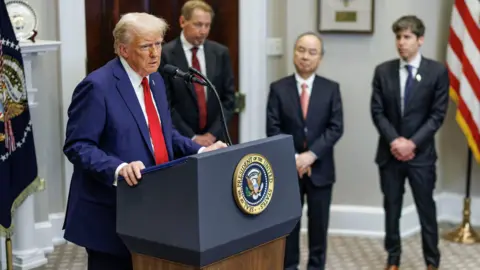In a significant move set to reshape the artificial intelligence (AI) landscape, OpenAI has formed a robust alliance with tech giants Oracle and SoftBank to spearhead the development of AI infrastructure. The newly established joint venture, aptly named Stargate, is poised to invest a staggering amount of up to $500 billion over the next four years. This ambitious initiative aims to construct state-of-the-art data centers specifically designed to power AI technologies, heralding a new era in the tech sector.
The announcement took place at the White House, where OpenAI’s CEO, Sam Altman, alongside executives from Oracle and SoftBank, expressed unequivocal confidence in the project’s potential. President Donald Trump, who was present, emphasized this plan as a “resounding declaration of confidence in America’s potential.” The venture will kick off with an immediate investment of $100 billion to expedite construction and operational efforts. Altman characterized the undertaking as “the most important project of this era,” highlighting its significance in the current technological climate.
The decision to invest heavily in AI infrastructure comes after OpenAI’s previous calls for substantial backing to create the necessary resources to support advancements in AI. The AI race has gained considerable momentum since the launch of ChatGPT, OpenAI’s chatbot that captivated users with its human-like conversational abilities. This increase in public interest and investment has spurred the need for specialized data centers that can provide the computing power needed to keep up with escalating demand.
In addition to the initial $100 billion, the Stargate venture plans to generate over 100,000 jobs, according to President Trump. As the project unfolds, Oracle’s Chief Technology Officer, Larry Ellison, announced that the first data centers are being constructed in Texas, with additional facilities slated for development in various locations across the United States. These efforts represent a critical response to the burgeoning demand for AI services, signaling a prospective shift in the industry towards enhanced infrastructure.
However, the rapid growth and expansion of data centers are not without challenges. Concerns have been raised regarding the implications of energy supply and the sustainability of the power needed to operate these facilities. In an effort to address these issues, former President Joe Biden initiated regulations to restrict the export of AI-related chips to multiple countries, fostering a controlled environment for AI development in the United States. Additionally, he placed emphasis on sustainable energy solutions aimed at powering these data centers, reflecting a broader commitment to environmental consciousness.
The partnership also includes international collaborators such as the UAE-backed investment firm, MGX, and major tech entities including Microsoft, Arm, and NVIDIA. The collaborative efforts underscore the wide-ranging implications of this initiative for the global tech industry, indicating a concerted push towards fostering AI capabilities and infrastructure both domestically and internationally.
Looking to the future, the demand for data center capacity is anticipated to surge significantly. Reports from consulting firm McKinsey suggest that global requirements for data centers could more than triple by the year 2030, with growth rates projected between 19% and 27% annually. To accommodate this increased demand, the industry may need to construct at least double the capacity that has existed since 2000. However, this ambitious goal may be impeded by challenges such as land availability, power constraints, and the regulatory environment surrounding new construction.
Similar investments are permeating the tech sphere, with significant commitments from other industry leaders. Microsoft, for example, is on track to channel around $80 billion into AI-powered data centers within the current year, complementing its involvement in a $100 billion venture alongside BlackRock. Amazon has also made waves, revealing intentions to invest approximately $20 billion across two major projects in just the past two months.
As these developments unfold, the intersection of technology, infrastructure, and sustainability will remain at the forefront, emphasizing the extraordinary pace at which the AI sector is evolving and the critical role of collaboration in navigating future challenges.



